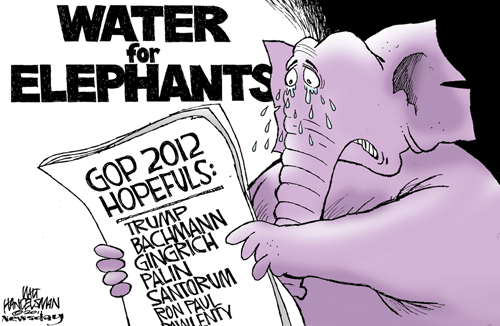“Punting the Pundits” is an Open Thread. It is a selection of editorials and opinions from around the news medium and the internet blogs. The intent is to provide a forum for your reactions and opinions, not just to the opinions presented, but to what ever you find important.
Thanks to ek hornbeck, click on the link and you can access all the past “Punting the Pundits”.
Eugene Robinson: Now casting: A few good GOP candidates

With the nation transfixed by the daring raid that killed Osama bin Laden, the first GOP presidential debate transpired last week with relatively little notice. For Republicans, that’s the good news.
The bad news is that for those who did pay attention, the debate brought to mind – and I’m just trying to be honest here, folks – the famous bar scene from “Star Wars.” At times the dialogue sounded like a faltering attempt at interplanetary communication. Can anyone seriously imagine Rick Santorum, Herman Cain, Ron Paul or Gary Johnson as president? Will anyone forgive Tim Pawlenty for joining such a motley crew?
Back on Earth, it’s hard to escape the conclusion that the elimination of bin Laden was good not only for national security, the interest of justice and the public mood, but for President Obama’s political prospects as well. He’s not unbeatable in 2012, but at the moment you’ve got to like his chances.
Dana Milbank: Muskets in hand, tea party blasts House Republicans
Poor Paul Ryan and John Boehner.
Ryan, chairman of the House budget committee, proposed budget cuts so severe his plan has been described as a suicide note. Boehner, the House speaker, rushed the budget to passage before Republicans grasped the potential fallout from their vote to replace Medicare.
Yet even this was not enough for the tea party.
On Monday morning, tea party leaders from around the country gathered at the National Press Club for a news conference denouncing Boehner and Ryan in terms normally reserved for that most loathsome of creatures, the Democrat.
“Instead of a fighter for U.S. taxpayers, Mr. Boehner has been a surrenderist, if that’s a word,” proclaimed William Temple, chairman of the Tea Party Founding Fathers. “It seems House Speaker John Maynard Boehner and his fellow RINOs – Republicans In Name Only – like to spend other peoples’ money just as much as the Democrats.”
On Friday, government officials anonymously claimed that “a rushed examination” of the “trove” of documents and computer files taken from the bin Laden home prove — contrary to the widely held view that he “had been relegated to an inspirational figure with little role in current and future Qaeda operations” — that in fact “the chief of Al Qaeda played a direct role for years in plotting terror attacks.” Specifically, the Government possesses “a handwritten notebook from February 2010 that discusses tampering with tracks to derail a train on a bridge,” and that led “Obama administration officials on Thursday to issue a warning that Al Qaeda last year had considered attacks on American railroads.” That, in turn, led to headlines around the country like this one, from The Chicago Sun-Times:
Click on image to enlarge
The reality, as The New York Times noted deep in its article, was that “the information was both dated and vague,” and the official called it merely “aspirational,” acknowledging that “there was no evidence the discussion of rail attacks had moved beyond the conceptual stage” In other words, these documents contain little more than a vague expression on the part of Al Qaeda to target railroads in major American cities (“focused on striking Washington, New York, Los Angeles and Chicago,” said the Sun-Times): hardly a surprise and — despite the scary headlines — hardly constituting any sort of substantial, tangible threat.
But no matter. Even in death, bin Laden continues to serve the valuable role of justifying always-increasing curtailments of liberty and expansions of government power. From Reuters (h/t Atrios):
Sen. Schumer proposes “no-ride list” for Amtrak trains
Dean Baker: The Big Retailers Versus the Big Banks: It Makes a Big Difference
The battle of the “swipe fees” has been hard to miss the last few weeks. The big banks are spending millions of dollars on TV, radio and Internet ads telling us that the government should not limit the fees that they charge on debit cards transactions. On the other side, a coalition of major retailers, such as Wal-Mart and Target, has been funding a comparable campaign to stop the bank gouging.
It may seem as though the public has little at stake in this battle between big banks and big retailers, but that is not true. In this case, Wal-Mart is on the side of the angels; small businesses and consumers will win if they prevail. This is an important battle in its own right, but even more important as a lesson in effective politics.
The basic story here should be a policy no-brainer. There are two major debit card networks, Mastercard and Visa, who essentially are the market. Together, they control more than 90 percent of the debit card market.
Robert Weissman: The US Chamber of Commerce in Wonderland
It’s a good rule of thumb: If the U.S. Chamber of Commerce — the trade association for large corporations — is whipped up about something, there’s probably good reason for the public to strongly back whatever has sent the Chamber into fits.
Well, the Chamber is apoplectic over a modest Obama administration proposed executive order that would require government contractors to reveal all of their campaign-related spending.
This is a case where the rule of thumb works. The proposed executive order would provide important information about campaign spending by large corporations, and work to reduce the likelihood that contracts are provided as payback for campaign expenditures. You can urge the administration to stand up to the U.S. Chamber of Commerce by signing the petition here.
The U.S. Chamber is of course no stranger to using exaggerated rhetoric to advance its positions. But its opposition to the Executive Order is astounding even by the standards of the Chamber.
Peter Dreier: How Do Wrong Economic Ideas Become Conventional Wisdom?
The ideas of Friedrich Hayek (1899-1992) are making a comeback, in large part due to Glenn Beck, who has touted the libertarian economist and philosopher’s views on his TV show. The essence of Hayek’s views — spelled out in his most well-known book, The Road to Serfdom — is that government stifles freedom and liberty. With a few exceptions, he viewed almost any governmental intervention in economic affairs as a slippery slope toward totalitarian socialism. No wonder that Beck has been hawking Hayek.
Now comes Francis Fukuyama, the neoconservative political scientist, who uses the pages of the New York Times Book Review to hawk his own version of government-bashing. Unfortunately, Fukuyama, who claims to be something of a student of Hayek’s ideas, hasn’t done his homework.
In his review of the new edition of Hayek’s The Constitution of Liberty, published in the Review on Sunday (May 8), Fukuyama off-handedly comments that three of Hayek’s ideas “have become broadly accepted by economists.” But it so happens that economists don’t agree on these three ideas. Moreover, the policy conclusions that Fukuyama draws happen to be untrue.
Richard (RJ) Eskow: The Economic Security President: Four Ways to Be “Bold” and “Gutsy” on the Home Front
The post-bin Laden afterglow is fading. Those video clips of his home movies seem like scenes from a reality show, not glimpses of an Existential Threat. It’s the master terrorist as an addled Ozzy Osbourne, minus the Beverly Hills couturiers and groomers. And while a few people might wait for bin Laden to sing Ozzy’s “Iron Man” — “Nobody wants him/He just stares at the world, planning his vengeance” — our attention-deficit nation is getting ready to move on.
Significantly, while the President’s overall approval rating jumped 11 percent after the killing, his economic approval fell and reached a new low: Only 34 percent approved of his handling of the economy, while 55 percent disapproved.
Jonathan Capehart: Jonathan Capehart
Oh, so you thought we were done with all this birther craziness? Ha! Not a chance. On Friday, Gov. Bobby Jindal (R-La.) released his birth certificate in a fit of pique and silliness over a newspaper getting his middle name wrong. Well, it was a little bit more involved than that.
Jindal threw his support behind a birther bill currently making its way through the state legislature that would require those who want to run for national office to show proof of U.S. birth in order to be on the Louisiana ballot. Last month, Baton Rouge newspaper the Advocate ran an editorial saying, “Piyush Amrit Jindal is the last man in America who should give his blessing to a birther bill.” Amen to that, since Jindal is the son of two immigrant parents whose journey from India to the United States was chronicled by the Times-Picayune.
But “Amrit” isn’t the governor’s middle name. Ticked off, Jindal released his long-form birth certificate to prove it.


Recent Comments